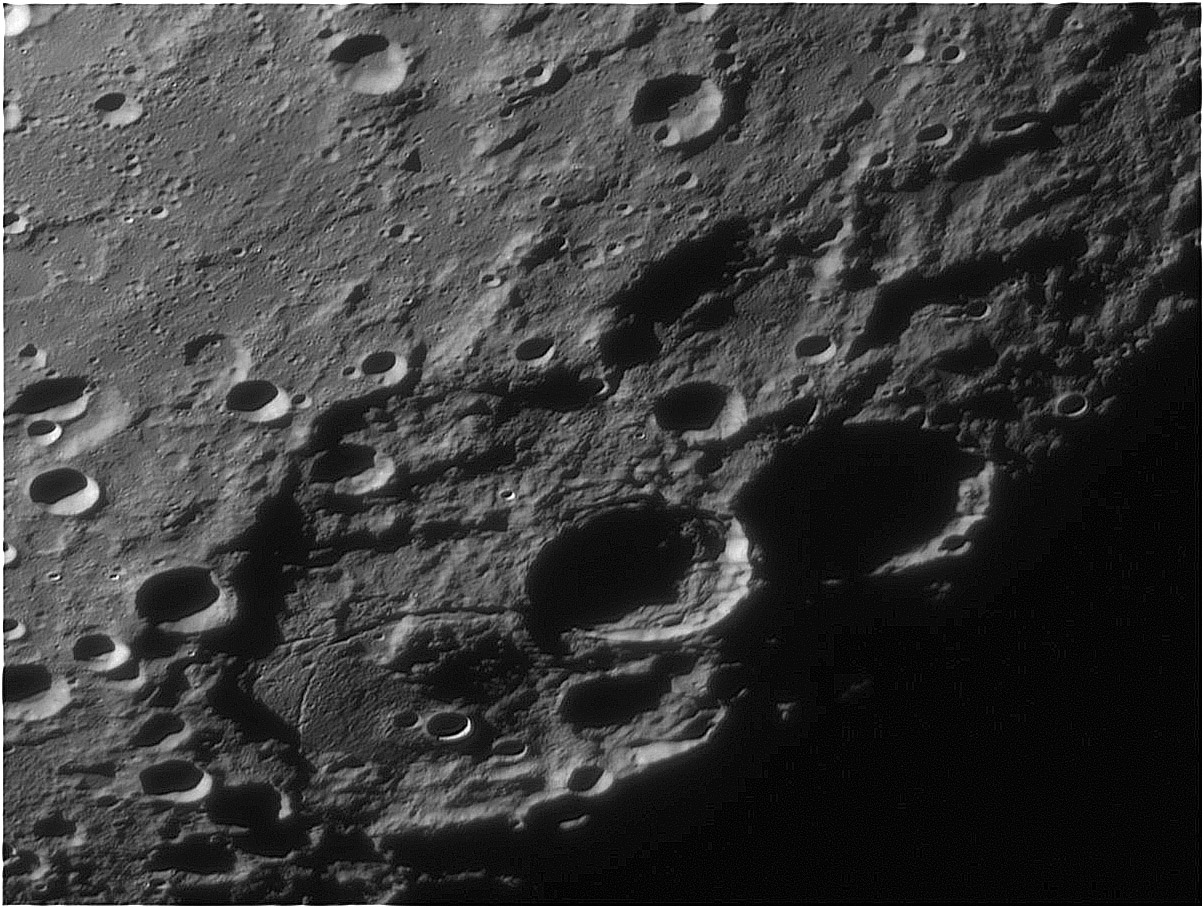Difference between revisions of "July 17, 2014"
| Line 3: | Line 3: | ||
<!-- ws:start:WikiTextHeadingRule:0:<h1> --> | <!-- ws:start:WikiTextHeadingRule:0:<h1> --> | ||
<!-- ws:start:WikiTextLocalImageRule:6:<img src="/file/view/LPOD-Jul17-14.jpg/516414960/LPOD-Jul17-14.jpg" alt="" title="" /> -->[[File:LPOD-Jul17-14.jpg|LPOD-Jul17-14.jpg]]<!-- ws:end:WikiTextLocalImageRule:6 --><br /> | <!-- ws:start:WikiTextLocalImageRule:6:<img src="/file/view/LPOD-Jul17-14.jpg/516414960/LPOD-Jul17-14.jpg" alt="" title="" /> -->[[File:LPOD-Jul17-14.jpg|LPOD-Jul17-14.jpg]]<!-- ws:end:WikiTextLocalImageRule:6 --><br /> | ||
| − | <em>image by [mailto:claude.navarro_toulouse@orange.fr | + | <em>image by [mailto:claude.navarro_toulouse@orange.fr Claude Navarro], Toulouse (France)</em><br /> |
<br /> | <br /> | ||
| − | The low Sun illumination of Claude's excellent image reveals all sorts of small scale texture in Janssen. It also suggests that the rille that seems to extend from the main rille and curve towards the southern rim cuts through a dome. Using LRO QuickMap altimetry profiles confirms that there is a rise there, about 350 m high and roughly 30 km wide. The knobby surface texture does not look like a typically smooth mare lava that domes usually form from. It could be mare lava that was pelted by ejecta from nearby Fabricius. Although there is some mare lava about 600 km away in Mare Australe, I doubt if such lava erupted on the floor of Janssen. But the existence of a family of rilles on Janssen's floor has never been well explained. In checking [http://bit.ly/1qIwA58 | + | The low Sun illumination of Claude's excellent image reveals all sorts of small scale texture in Janssen. It also suggests that the rille that seems to extend from the main rille and curve towards the southern rim cuts through a dome. Using LRO QuickMap altimetry profiles confirms that there is a rise there, about 350 m high and roughly 30 km wide. The knobby surface texture does not look like a typically smooth mare lava that domes usually form from. It could be mare lava that was pelted by ejecta from nearby Fabricius. Although there is some mare lava about 600 km away in Mare Australe, I doubt if such lava erupted on the floor of Janssen. But the existence of a family of rilles on Janssen's floor has never been well explained. In checking [http://bit.ly/1qIwA58 QuickMap] I noticed that this small curved rille, about 1.6 km wide, has a northern side that is much higher than the southern side, and that the last 10 km is not a rille, but a scarp. <br /> |
<br /> | <br /> | ||
| − | <em>[mailto:tychocrater@yahoo.com | + | <em>[mailto:tychocrater@yahoo.com Chuck Wood]</em><br /> |
<br /> | <br /> | ||
<strong>Technical Details</strong><br /> | <strong>Technical Details</strong><br /> | ||
Revision as of 20:10, 17 January 2015
Find a Rille, And It Goes Round, Round, Round

image by Claude Navarro, Toulouse (France)
The low Sun illumination of Claude's excellent image reveals all sorts of small scale texture in Janssen. It also suggests that the rille that seems to extend from the main rille and curve towards the southern rim cuts through a dome. Using LRO QuickMap altimetry profiles confirms that there is a rise there, about 350 m high and roughly 30 km wide. The knobby surface texture does not look like a typically smooth mare lava that domes usually form from. It could be mare lava that was pelted by ejecta from nearby Fabricius. Although there is some mare lava about 600 km away in Mare Australe, I doubt if such lava erupted on the floor of Janssen. But the existence of a family of rilles on Janssen's floor has never been well explained. In checking QuickMap I noticed that this small curved rille, about 1.6 km wide, has a northern side that is much higher than the southern side, and that the last 10 km is not a rille, but a scarp.
Chuck Wood
Technical Details
July/16/2014, 04H45 TU. C14 + Basler 1300 + IR pass 685. 250 images (of 2000) processed with AS2! and Registax 6.
Related Links
21st Century Atlas chart 5.



